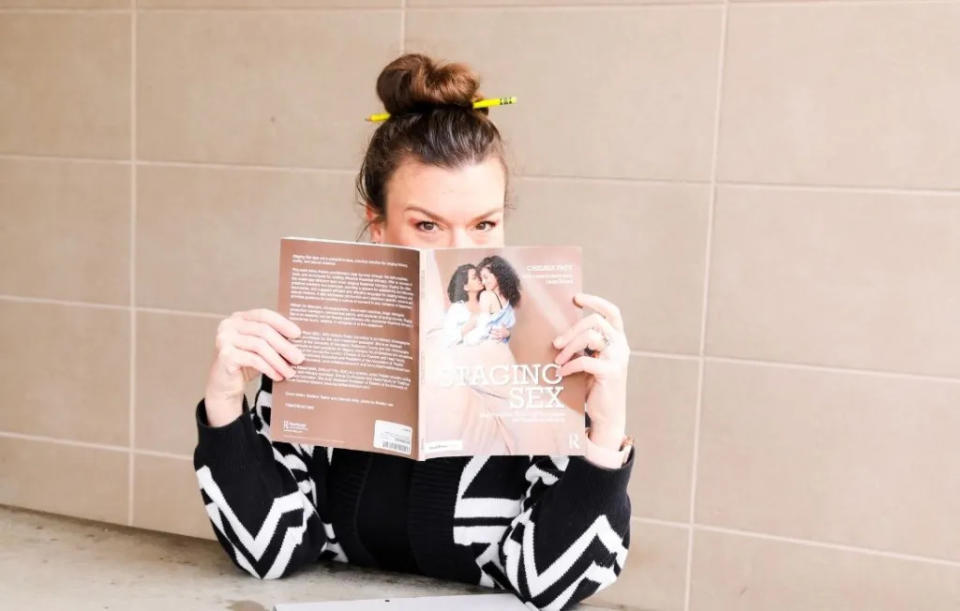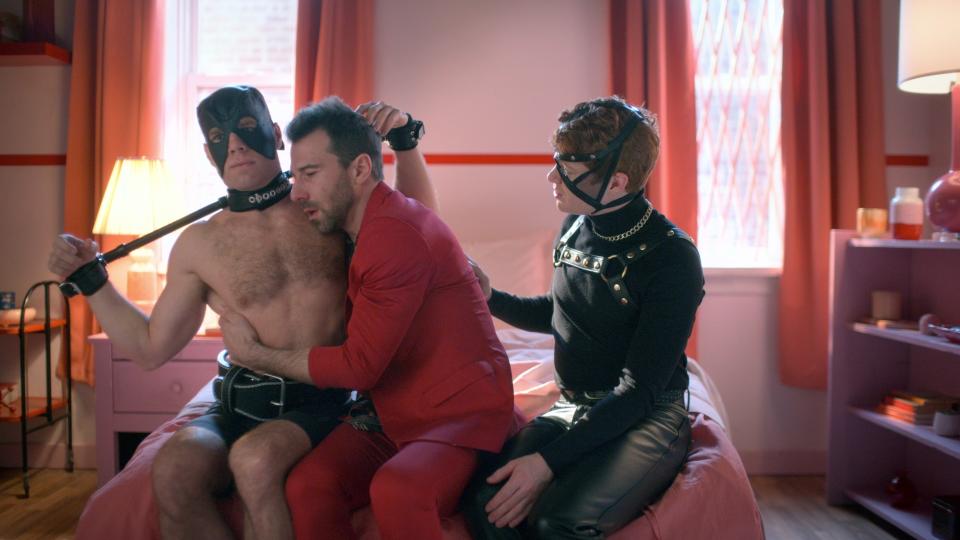Intimacy Coordinators and Mental Health: How Hollywood Wants to Protect Your Body and Mind

Hair and makeup professionals aren’t paid enough to also be an actor’s therapist — nor are they trained for it. A growing wave of intimacy coordinators are.
Amanda Edwards has been an intimacy coordinator in film, TV, and theater since 2020, but she’s also a licensed therapist. Because of that background, she was asked to perform mental health care for people on set. Just as she’d have to deal with how to portray an intimate sex scene properly and with appropriate consent, directors and producers were asking her to mitigate mental health crises when filming other intense scenes.
More from IndieWire
South by Southwest to Expand with SXSW London Edition in June 2025
Edgar Wright Praises 'Furiosa' as a Revenge Epic on Par with 'Ben Hur'
“Productions were asking me, how can we portray this responsibly? How can we minimize harm to our performers, to our audience members?” Edwards told IndieWire. “I was doing mental health crisis mitigation for not only the cast members who were performing the thing, but also for the crew members who had to watch the thing happen over and over and over again, sometimes with their own lived experience.”
She realized “pretty darn quick” that what she was not doing was not intimacy coordination; “this is a different job.” And though not everyone in the field is also a therapist, she wasn’t the only one being asked to pull double duty.
So she made up a name for her new work: mental health coordinator.
“Intimacy coordination is nudity, simulated sex, and acts that feel intimate to performers. And yes, that may include some emotionally charged material, absolutely,” Edwards explained. “But the work of mental health coordination goes far beyond just the consent and boundary practice of the performers.”
A mental health coordinator, as Edwards describes, is someone who deals with providing care and emotional support to those who need it on set during the filming of difficult moments. Torture scenes are definitely a common one she’s had to deal with. Depictions of child abuse, addiction or substance abuse, suicide attempts, or sexual assault are also tough. She’s there for the actors who need to perform these heavy scenes, but also for the boom operator who has to hear screaming in their headphones over and over again, or the cameraman who might have an unexpected trigger.
“We consistently get feedback that ‘I don’t know why we’ve been trying to do this without you for all this time. We’re so grateful that you’re here,'” Edwards said.

The work of mental health coordinators is still largely uncredited. But an increasing number of indie productions and studio episodic projects are slowly looking for ways to provide mental care for their teams. So Edwards, who has worked on projects for HBO, ABC, and other indies, is the founder of the Association of Mental Health Coordinators (AMHC), an organization that certifies mental health coordinators, offering training and resources for intimacy coordinators and others who want to expand into mental health. Her 10-week course only accepts people who are already approved mental health professionals (AMHPs) who want to learn about working on film and TV sets. Currently about 20 individuals are certified in Edwards’ first round, but there are others across Hollywood doing the work of a mental health coordinator without formal certification.
Sometimes Edwards wears both hats of an intimacy coordinator and a mental health coordinator, but it’s not easy, and she and others in her field believe the two should be considered separate jobs. As an intimacy coordinator, she needs to focus on the monitors and be attuned to the performers. But that’s a challenge when potentially dozens of other people on set need attention.
The good news is performers and filmmakers are starting to recognize the need for both roles. Actress Alyson Stoner recently said on her “Dear Hollywood” podcast that MHCs should be essential any time a minor is on set. Anne Hathaway didn’t mention the specific role, but she recently said it was a godsend to have an intimacy coordinator who also cared for her mental health in addition to intimate scenes on her upcoming film “Mother Mary.”
“[It’s] someone there who is making sure—in a moment of vulnerability, when you’re showing something true and sacred to yourself—that you’re not going to be harmed,” Hathaway told Vanity Fair.
Intimacy coordinators started to rise alongside the #MeToo movement. Actors finally put their foot down about preventing abuses of power on set and protecting actors when they’re at their most vulnerable. It’s led to notable change in the industry with more movies and shows embracing sex in their stories. And it’s why intimacy coordinators are the first beating the drum for mental health professionals working alongside them.
“Statistically speaking, when you have a traumatic or emotionally charged moment in a script, you’re going to have a cast or crew member who has that lived experience in the room,” Edwards said. “There’s often a moment of realization of ‘oh yeah, we should probably have some safety net in place to support them, just in case.’ In my mind, it just makes sense.”
Olivia Troy is one of the founding members of Reps on Set, an organization that represents intimacy coordinators like herself but also trained mental health coordinators. Having worked on shows like “Billions” and “Bonding” and specializing in intimate scenes involving BDSM, she’s frequently consulted to do a script review and determine the best person for the job or jobs. Sometimes that involves finding someone trained with working with plus-sized actors, trans performers, or people of different races. But it also includes mental health.

Her job and training is to support intimate scenes, to help actors feel comfortable, to do choreography, make sure consent is followed, or even keep an actor’s breath fresh. But that’s not the same as mental health support.
“Say you’re doing a scene of sexual violence: as the intimacy coordinator, I can choreograph it beautifully, I can find some choreography that is repeatable, and that tells the story that is within the actor’s boundaries,” Troy said. “But that has nothing to do with what the actor might be going through mentally and emotionally to do that scene over and over and over again.”
Troy says to think of it like a sports therapist; they’re not there to have the cast and crew (or in the analogy, the athlete) lie on a couch and talk about their parents, but they can pop in like a medic to help a performer decompress between scenes. They provide a space to talk and keep everyone productive and present on set, and if it’s done correctly, it keeps everything more efficient. She says there are plenty of newer filmmakers who understand the value of mental health support in the workplace, and for them, it’s a “no-brainer.”
“Sometimes it’s like, ‘Oh my gosh, I’m really excited about this. This would be great. I didn’t even know that this existed. Yes, please,'” Troy said she’s heard from clients.
There’s also a key difference between a mental health coordinator and an on-set therapist. A mental health coordinator is there to support the mental well-being of everyone involved. What it’s not is individual therapy to treat a specific mental health condition. Some individual actors, like Lady Gaga on “House of Gucci,” may ask for someone who can be catered to their needs. But mental health coordinators are there to offer grounding strategies or help stabilize actors for the benefit of the whole production.
Brooke M. Haney, the author and editor of a new book called “The Intimacy Coordinator’s Guidebook,” is not a mental health coordinator, but she developed a method she called the Actor’s Warm Down process to allow performers to better center themselves after intense scenes. As an actor herself, every class she took taught her how to get to a place of deep emotional honesty and intensity. But she was never taught how to reel back in.

“No matter how much intellectually you tell yourself this thing that I’m doing is fake, when you put your body into a position of fear or terror or you’re the perpetrator, you put yourself in a power hungry place,” Haney said. “Your body doesn’t know that it’s fake. Your body experiences it as if it’s real because you put it in that position.”
While some people still view intimacy coordinators just as the quote-unquote consent police, others see them as creative collaborators who can help choreograph a scene with specific expertise. MHCs can similarly help in depicting suicide scenes or how to be sensitive to certain triggers, at least for the productions that are open to it.
“Not all directors or studios want that,” Edwards said. “I’m a big fan of not inserting myself where I am not wanted and not needed. Like if someone tells me they’re fine, I’m going to step back and just be there to hold space if and when someone is not fine.”
But Haney also believes mental health coordinators can have a practical value as well as a creative one. Time and again we’ve heard of actors freak out or flame out, and having someone there to prevent a mental health crisis can go a long way.
“It’s about just taking care of people that we work with,” Haney said. “From a production and business standpoint, it will save time, which then saves you money. When someone isn’t in mental health crisis, if you have put in place ways for people to take care of themselves, that’s going to be super helpful and allow actors to have a sustainable career.”
Best of IndieWire
The Best LGBTQ Movies and TV Shows Streaming on Netflix Right Now
Guillermo del Toro's Favorite Movies: 54 Films the Director Wants You to See
Nicolas Winding Refn's Favorite Films: 37 Movies the Director Wants You to See
Sign up for Indiewire's Newsletter. For the latest news, follow us on Facebook, Twitter, and Instagram.
